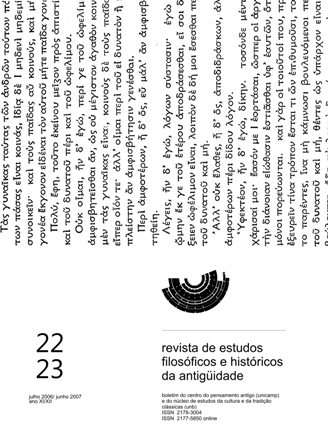Resumo
Que Roma teve um dos maiores impérios do qual se tem notícia é um fato bem documentado. Todavia, pode-se perguntar o que levou os romanos a expandirem sua área de influência para territórios tão heterogêneos quanto a África, Ásia e o norte e leste da Europa. E mais, como puderam, habilmente, manter um império tão vasto que durou séculos em aparente hegemonia. Este estudo procura discutir a natureza do imperialismo romano e como um de seus principais conceitos ajudou a legitimar e sancionar suas ações. Serão analisados, ainda, os discursos que subsidiam a crença comum de que aquilo que foi oferecido pelos romanos era por demais sedutor para ser resistido pelos povos conquistados.
Referências
AULUS GELLIUS, The Attic Nights. With an English Translation by John C.Rolfe, PhD., Litt.D. Cambridge, Massachusetts: Harvard University Press.1978.
CÉSAR, The Gallic War. With an English Translation by H.J. Edwards, C.B.Cambridge, Massachusetts: Harvard University Press. The Loeb ClassicalLibrary, 1986.
CÍCERO, The Letters to His Brother Quintus. Translated by W. Glynn Williams,M.A.. Cambridge, Massachusetts: Harvard University Press. The LoebClassical Library, 1989.
ESTRABÃO, The Geography of Strabo. With an English Translation by HoraceLeonard Jones, PhD., L.L.D. Cambridge, Massachusetts: Harvard UniversityPress. The Loeb Classical Library, 1988.
PLÍNO, o Moço, Letters and Panegyricus. With an English Translaton by BettyRadice. Cambridge, Massachusetts: Harvard University Press. The LoebClassical Library, 1975.
TÁCITO, Agricola. Translated by M. Hutton. Cambridge, Massachusetts: HarvardUniversity Press. The Loeb Classical Library, s.d..
VIRGÍLIO, Eneida. Tradução de David Jardim Junior. Ediouro, s.d.
DÍAZ-ANDREU, M. (1996) “Constructing identities through culture: the past inthe forging of Europe”. In: P. Graves-Brown, S. Jones e C. Gamble (eds)Cultural Identity and Archaeology: the construction of
Europeancommunities. Londres: Routledge. Pp. 48-61.
FREEMAN, P.W.M (1993) “ ‘Romanisation’ and Roman material culture”. JRSvol. 6, pp. 438-41.
FUNARI, P. P. A. (2001) Grécia e Roma, São Paulo: Contexto.
GARNSEY, P. (1991) “The Generosity of Veyne”. JRS vol. 81, pp.164-8.
GARNSEY, P. D. A. e C. R. Whittaker eds. (1978) Rome’s African Empire underthe Principate. Cambridge: CUP
GARRAFFONI, R. (2008) ‘Bretanha Romana: Repensando os DiscursosArqueológicos’. In: FUNARI, P. P. A. et alii (orgs.) História Antiga:contribuições brasileiras, São Paulo: AnnaBlume.Pp. 101-14.
HANSON, W.S. (1997) “Forces of change and methods of control”. In Mattinglyed. (1997), pp.67- 80.
HINGLEY, R. (1997) “Resistence and domination: social change in Roman Britain”.In: Mattingly ed. (1997), pp. 81-100.
HINGLEY, R(1996) “The ‘legacy’ of Rome: the rise, decline, and fall of the theory ofRomanization”. In Jane Webster e Nicholas J. Cooper eds. (1996) RomanImperialism: Post-Colonial Perspectives, pp. 35-48. Leicester: LeicesterArchaeology Monographs 3.
JONES, S. (1997) The Archaeology of Ethnicity: Constructing identities in thepast and present, Londres: Routledge.
LAURENCE, R. e J. Berry eds. (1998) Cultural Identity in the Roman Empire,Londres: Routledge.
MACMULLEN, R. (2000) Romanization In The Time Of Augustus. New Haven:Yale University Press.
MATTINGLY, D.J. ed. (1997) Dialogues in Roman Imperialism. Power, discourseand discrepant experience in the Roman Empire. JRS (suplemento 23),Portsmouth: RI.
MILLETT, M. (1990) The Romanization of Britain: An essay in ArchaeologicalInterpretation. Cambridge: CUP (edição em paperback 1992).
A Revista de Estudos Filosóficos e Históricos da Antiguidade utiliza a licença Creative Commons — Attribution-NonCommercial-NoDerivatives 4.0 International — CC BY-NC-ND 4.0. Esta é a mais restritiva das nossas seis licenças principais, só permitindo que outros façam download dos seus trabalhos e os compartilhem desde que atribuam crédito a você, mas sem que possam alterá-los de nenhuma forma ou utilizá-los para fins comerciais. Revista de Estudos Filosóficos e Históricos da Antiguidade Revista de Estudos Filosóficos e Históricos da Antiguidade
